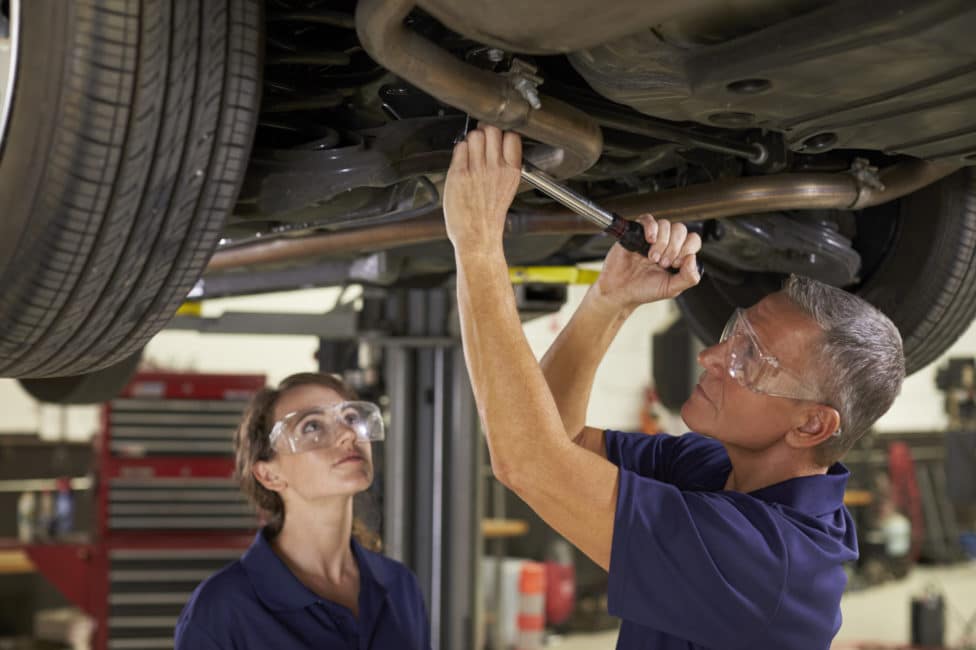A mechanic apprenticeship is the ideal way to gain entry to the Automotive Retail, Service and Repair industry. This industry can be an exciting one and is ever changing as the world embraces more modern technologies. These include the emergence of hybrid and fully battery powered cars, computerisation, and fuel injection systems.
If you think you’ll enjoy working on the following, an automotive apprenticeship could be the ideal choice for you:
- Changing vehicle parts
- Testing for defective electrical and mechanical parts
- Fitting a vehicle with a new motor
- Fitting new wiring
- Repairs
- Explaining mechanical issues to clients
An ideal mechanic apprentice has good communication skills and a problem solving mindset. He or she will enjoy working with their hands, and have no problem using tools. Great listening skills are also very desired by employers, as they allow apprentices to adapt quicker to new challenges during the mechanic apprenticeship and increase their overall automotive knowledge quicker.
How long does it take to complete a Mechanic apprenticeship?
A mechanic apprenticeship typically takes four years to complete. Training consists of on the job training with an employer and off the job training through a Registered Training Organisation. It is quite common for apprentices to start working in light vehicle environments, before moving on to heavier types.
Typical duties of a mechanic apprentice
There are a whole host of different career paths one can take with a mechanic apprenticeship. It is possible to get an apprenticeship as an automotive mechanic, a brake specialist, or an engine reconditioner to name just a few. Typical duties involve diagnosing issues, servicing and repairing or replacing defective parts or components.
Typical requirements
There are a variety of skills required if you would like to undertake an automotive apprenticeship. Employers usually expect an apprentice to demonstrate an interest in mechanics, this can be illustrated to them by highlighting any relevant school or hobby experience.
A lot of employers also expect apprentices to have completed Year 10 or higher and have a good grounding in maths, engineering, science and technology to start with.
Most employers will ask for a driver’s license and manual ones are usually more desirable.
It’s a good idea to start your training with an Automotive Serviceperson Certificate II. This will ensure you have the right starting skills needed to secure an apprenticeship and also help demonstrate to employers that you are a candidate serious about embarking on an automative carreer.
Qualified Automotive Mechanic’s average wage
As a qualified Automotive Mechanic you can expect to earn an average of $61,857 per year. This information is supplied by the worksite Indeed and is based on 252 salaries submitted by Automotive Mechanics and collected from job advertisements over 36 months.
More specific information about wages can be found here.
Some of the more popular certificates include:
Certificate III in Light Vehicle Mechanical Technology
Light Vehicle Mechanical Technicians service and repair mechanical motor parts. This may be engines, suspension systems or transmissions on different light vehicles. Working practices follow strict environmental, sustainability and safety guidelines.
Through working as a Light Vehicle Mechanical Technician you will be involved with:
- Testing and repairing electrical circuits
- Diagnostics and repairs
- Carrying out periodic services on vehicles
- Inspection and service of brakes
- Repair of cooling systems
- Inspection and service of vehicle engines
- Inspection and service of fuel systems
- Using and maintaining tools
- Responding to customers requests and requirements
- Depowering and reinitialising hybrid vehicles
- Servicing air conditioning systems
- Repairing clutch systems
- Conducting wheel alignment operations
- Removal and refitting of tyres and wheels
- Conducting safety inspections
Certificate III in Automotive Diesel Fuel Technology
As an Automotive Heavy Diesel Fuel Technician you would be involved with working on heavy vehicle diesel fuel systems and components. You may also work with light vehicles from time to time. Through your work, you’ll use diagnostic procedures to service and repair heavy vehicle fuel systems and the accompanying components.
With a Certificate III in Automotive Diesel Fuel Technology you will be able to work by:
- Following environmentally sound and sustainable practices
- Following safety regulations
- Testing and repairing electronics
- Diagnosing and repairing a variety of different systems
- Inspecting and servicing engines, diesel fuel injection systems and heavy vehicle emission control systems
- Servicing
- Using and maintaining tools and equipment
- Using welding on components
- Removal and instillation of heavy vehicle engines
How to find and secure an automotive apprenticeship
Australian Apprenticeships Pathways has further information about apprenticeships, career pathways and even handy aptitude quizzes.
You can find a wealth of useful information related to your automotive apprenticeship here. This is the ideal place to start looking for an apprenticeship or a pre-apprenticeship.


